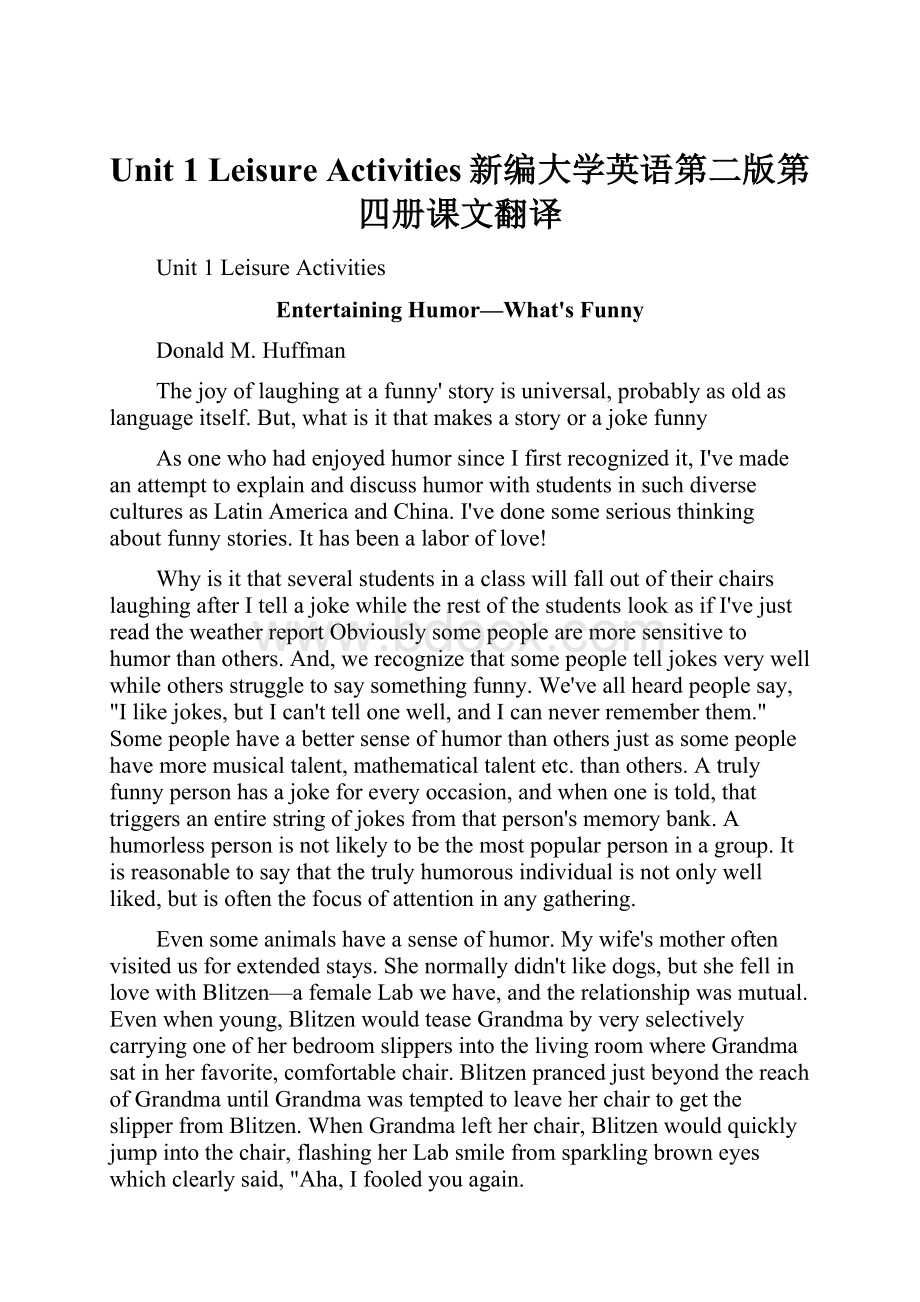Unit 1 Leisure Activities新编大学英语第二版第四册课文翻译.docx
《Unit 1 Leisure Activities新编大学英语第二版第四册课文翻译.docx》由会员分享,可在线阅读,更多相关《Unit 1 Leisure Activities新编大学英语第二版第四册课文翻译.docx(16页珍藏版)》请在冰豆网上搜索。

Unit1LeisureActivities新编大学英语第二版第四册课文翻译
Unit1LeisureActivities
EntertainingHumor—What'sFunny
DonaldM.Huffman
Thejoyoflaughingatafunny'storyisuniversal,probablyasoldaslanguageitself.But,whatisitthatmakesastoryorajokefunny
AsonewhohadenjoyedhumorsinceIfirstrecognizedit,I'vemadeanattempttoexplainanddiscusshumorwithstudentsinsuchdiverseculturesasLatinAmericaandChina.I'vedonesomeseriousthinkingaboutfunnystories.Ithasbeenalaboroflove!
WhyisitthatseveralstudentsinaclasswillfalloutoftheirchairslaughingafterItellajokewhiletherestofthestudentslookasifI'vejustreadtheweatherreportObviouslysomepeoplearemoresensitivetohumorthanothers.And,werecognizethatsomepeopletelljokesverywellwhileothersstruggletosaysomethingfunny.We'veallheardpeoplesay,"Ilikejokes,butIcan'ttellonewell,andIcanneverrememberthem."Somepeoplehaveabettersenseofhumorthanothersjustassomepeoplehavemoremusicaltalent,mathematicaltalentetc.thanothers.Atrulyfunnypersonhasajokeforeveryoccasion,andwhenoneistold,thattriggersanentirestringofjokesfromthatperson'smemorybank.Ahumorlesspersonisnotlikelytobethemostpopularpersoninagroup.Itisreasonabletosaythatthetrulyhumorousindividualisnotonlywellliked,butisoftenthefocusofattentioninanygathering.
Evensomeanimalshaveasenseofhumor.Mywife'smotheroftenvisitedusforextendedstays.Shenormallydidn'tlikedogs,butshefellinlovewithBlitzen—afemaleLabwehave,andtherelationshipwasmutual.Evenwhenyoung,BlitzenwouldteaseGrandmabyveryselectivelycarryingoneofherbedroomslippersintothelivingroomwhereGrandmasatinherfavorite,comfortablechair.BlitzenprancedjustbeyondthereachofGrandmauntilGrandmawastemptedtoleaveherchairtogettheslipperfromBlitzen.WhenGrandmaleftherchair,Blitzenwouldquicklyjumpintothechair,flashingherLabsmilefromsparklingbrowneyeswhichclearlysaid,"Aha,Ifooledyouagain.
Typicaljokesorhumorousstorieshaveathree-partanatomythatiseasilyrecognized.FirstistheSETUP(orsetting),nextistheBODY(orstoryline),andthesearefollowedbythePUNCHLINE(anunexpectedorsurpriseending)whichwillmakethejokefunnyifitcontainssomehumor.Usuallyallthreepartsarepresent,andeachmustbeclearlypresented.Ithelpsifthestory/joketellerusesgesturesandlanguagewhicharewellknowntotheaudience.
Humor,asaformofentertainment,canbeanalyzedinordertodiscoverwhatmakesafunnystoryorjokeseemfunny.Here,forexample,aresomeofthemostcommontypesofhumor.Theyrangefromthemostobvioushumortothemoresubtletypes.
"SLAP-STICK"isthemostobvioushumor.Itslanguageissimple,direct,andoftenmakesfunofanotherpersonorgroup.Slap-stickwasandisthetechniqueofthestand-upcomedianandtheclown.Itappealstoallagesandallcultures.NearlyeveryEnglish-speakingcomedianinthiscenturyhasusedthefollowingjokeinoneformoranother.Onemanasksanother,"WhowasthatladyIsawyouwithlastnight"Theotherreplies,"Thatwasnolady,thatwasmywife."Thehumorliesinthefactthatthesecondmanissayingthathiswifeisnotalady.Inotherwords,sheisnotarefinedwoman.Thejokeisnolessfunnybecauseitissooftenused.Theaudienceknowsinadvancewhatwillbesaid,becauseitisclassichumor,andanyaudiencevaluesitevenmorebecauseofitsfamiliarity.
Chinese"cross-talk"isaspecialtypeofslap-stickinwhichtwoChinesecomedianshumorouslydiscusstopicssuchasbureaucrats,familyproblems,orotherpersonaltopics.Cross-talkcanbeheardanywherefromsmallvillagestagestothelargestBeijingtheatres,andtoradioandtelevision.ItisclearlyatraditionalformofhumorwellunderstoodbyChinesepeople.
APLAYONWORDSisnotsoobviousasslap-stick,butitisfunnybecauseofmisusedormisunderstoodlanguage.MyfavoriteexampleisthestoryofthreeelderlygentlementravelingbytraininEngland.Asthetrainslowedforastopthefirstmanasked,"IsthisWembley""No,"saidthesecond,"It'sThursday.""SoamI,"saidthethirdman."Let'sstopforabeer."Weknowthatolderpeopleoftendonothearthingsclearly,sothemisunderstandingofbothWednesday(forWembley)andthirsty(forThursday)makeanicesetupforthepunchlinedeliveredbythethirdman.
ThefamousChinesecartoonistandhumoristDingCongisamasterofwordplay.Inoneofhisfunnycartoons,ateachersays,"Howcomeyoucompletelycopiedsomebodyelse'shomework"Theyoungstudentreplies,"Ididn'tcompletelycopyit.Mynameonthepageisdifferent."InanotherclassicDingCongcartoon,anirritatedfatherasks,"Tellme,what'soneplustwo"Thesonsays,"Idon'tknow."Theimpatientfatherthensays,"Forexample,you,yourmother,andIaltogetherarehowmany,youidiot"Thesonproudlyanswers,"Threeidiots."Whetherthesestoriesarecartoons,jokestoldbyaslapstickcomedian,oracross-talkingteam,theyappealtopeopleeverywhereasfunnystoriesbecausetheyhaveanoteofrealitytothem,andtheunexpectedpunchlineisquitefunny.11PUNSareevenmoresubtleformsofwordplay.Theyusethetechniqueofsimilarsoundingwordsoralternativemeaningsofthesameword.Punsarethoughtbysomecriticstobethelowestformofhumor,butIdisagreewiththis.Punsrequiremoresubtleandsophisticatedlanguageskillsthanmosthumorforms,buteventheveryyoungcanusethemintheirsimplerforms.Forexample,the"riddle"ortrickquestionoftenusesapuninthesetup,thestoryline,or,moreoften,thepunchline.PunsarethefirsttypeofhumorIlearned,andatabout5yearsofageIrememberhearingthefollowingriddle.Onepersonasks,"Whatisblackandwhiteandredallover"Theotherpersonusuallycannotanswertheriddle,sosays,"Igiveup.Whatistheanswer"Theriddlerreplies,"Anewspaper."Thisistheobviousanswerifoneknowsthat"red"ispronouncedthesameas"read"inEnglish,butthemeaningsareclearlydifferent.
DOUBLE-ENTENDRES(Frenchfordoublemeanings)arespecialvariationsofpunsinwhichwordsorphraseshavedoublemeanings.Frequentlythetwomeaningsareverydifferent,andoneisquiteproperwhilethesecondisoften,butnotalways,vulgar.Ilikethesomewhatmildstoryofaschoolteacherandaprincipalofahighschoolwhoareconcernedbecausesomeboysandgirlshavebeenseenkissingontheschoolplayground.Theteachersaystothestudents,"TheprincipalandIhavedecidedtostopkissingontheschoolplayground."Hearingsomelaughter,shesenseshermessagewasnotaltogetherclear,sosheadds,"WhatImeantosayisthattherewillbenomorekissinggoingonunderournoses".Thisclarification,ofcourse,doesnothingtocorrectthefirststatementandthedoublemeaningofthejokebecomesevenmorelaughable.
Someprofessionalhumoriststhinktoomuchoftoday'shumorisnotveryintelligentorsophisticated.Theydislikethesuggestiveorvulgarlanguageusedtoofrequently,andtheyfeelthatmosthumoristsarenotverycreative.Itistruethatsomeoftoday'shumorisrathershocking,butIdon'tthinkhumoristobeblamedforthat.Humorisaliveandwell,anditwillpersistsimplybecausetherearefunnythingshappeningeveryday.Somehumorouspeopleseeandhearthesefunnythingsandareabletomakethemintofunny,entertainingjokesandstories.
享受幽默——什么东西令人开怀
1听了一个有趣的故事会发笑、很开心,古今中外都一样。
这一现象或许同语言本身一样悠久。
那么,到底是什么东西会使一个故事或笑话让人感到滑稽可笑的呢
2我是第一次辨识出幽默便喜欢上它的人,因此我曾试图跟学生议论和探讨幽默。
这些学生文化差异很大,有来自拉丁美洲的,也有来自中国的。
我还认真地思考过一些滑稽有趣的故事。
这么做完全是出于自己的喜好。
3为什么听我讲完一个笑话后,班上有些学生会笑得前仰后合,而其他学生看上去就像刚听我读了天气预报一样呢显然,有些人对幽默比别人更敏感。
而且,我们也发现有的人很善于讲笑话,而有的人要想说一点有趣的事却要费好大的劲。
我们都听人说过这样的话:
“我喜欢笑话,但我讲不好,也总是记不住。
”有些人比别人更有幽默感,就像有些人更具有音乐、数学之类的才能一样。
一个真正风趣的人在任何场合都有笑话可讲,而且讲了一个笑话,就会从他记忆里引出一连串的笑话。
一个缺乏幽默感的人不可能成为一群人中最受欢迎的人。
一个真正有幽默感的人不仅受人喜爱,而且在任何聚会上也往往是人们注意的焦点。
这么说是有道理的。
4甚至有些动物也具有幽默感。
我岳母从前经常来我们家,并能住上很长一段时间。
通常她不喜欢狗,但却很喜欢布利茨恩—我们养过的一条拉布拉多母猎犬。
而且,她们的这种喜欢是相互的。
布利茨恩在很小的时候就常常戏弄外祖母,当外祖母坐在起居室里她最喜欢的那张舒适的椅子上时,布利茨恩就故意把她卧室里的一只拖鞋叼到起居室,并在外祖母刚好够不到的地方蹦来跳去,一直逗到外祖母忍不住站起来去拿那只拖鞋。
外祖母从椅子上一起来,布利茨恩就迅速跳上那椅子,从它那闪亮的棕色眼睛里掠过一丝拉布拉多式的微笑,无疑是在说:
“啊哈,你又上了我的当。
”
5典型的笑话或幽默故事由明显的三部分构成。
第一部分是铺垫(即背景),接下来是主干部分(即故事情节),随后便是妙语(即一个出人意料或令人惊讶的结尾)。
如果这个妙语含有一定的幽默成分,这个笑话便会很有趣。
通常笑话都包含这三部分,而且每部分都必须交代清楚。
如果讲故事或说笑话的人使用听众都熟悉的手势和语言,则有助于增强效果。
6我们可以对幽默这种娱乐形式,进行分析,从而发现究竟是什么使一个有趣的故事或笑话令人发笑。
举例来说,最常见的幽默有以下几种,包括了从最显而易见的幽默到比较微妙含蓄的幽默。
7“滑稽剧”是最明显的幽默。
它语言简单、直截了当,常常以取笑他人为乐。
说笑打闹这种形式过去是、现在仍然是滑稽说笑演员和小丑的惯用技巧。
它为不同年龄、不同文化背景的人们所喜爱。
几乎本世纪的每个讲英语的滑稽说笑演员都曾以这样或那样的方式说过下面这则笑话。
一位男士问另一位男士:
“昨晚我看到的那位和你在一起的贵妇是谁”那位男士回答道:
“那可不是什么贵妇,那是我老婆。
”这个笑话的幽默之处在于第二位男士说他的妻子不是一位贵妇,也就是说她不是一个高雅的女人。
这个笑话并没有因为经常讲而变得不再那么好笑。
由于这是一个经典笑话,观众都知道要说什么,而且因为大家对这个笑话很熟悉而更加珍爱它。
8中国的相声是一种特殊的滑稽剧。
相声中两名中国喜剧演员幽默地谈论诸如官僚主义者、家庭问题或其他一些有关个人的话题。
相声随处都能听到,无论是在乡村的小舞台上,还是在北京最大的剧院里,抑或在广播、电视上。
它显然是中国人家喻户晓的一种传统的幽默形式。
9“俏皮话”不像滑稽剧那样浅显,它是因语言的误用或误解而引人发笑。
我特别喜欢的一个例子是三位年长的绅士在英国乘火车旅行的故事。
当火车慢慢停下来时,第一位绅士问道:
“这是Wembley(温布利)吗”“不,”第二位绅士说:
“是Thursday(星期四)。
”“我也是,”第三位说道,“让我们下车喝杯啤酒吧。
”我们知道上了年纪的人往往耳背,因此会把Wembley(温布利)听成了Wednesday(星期三),把Thursday(星期四)听成了thirsty(渴了),这样一来就为第三位老人的妙语做好了铺垫。
10著名的中国漫画家和幽默家丁聪便是一位俏皮话大师。
在他的一幅幽默漫画中,一位老师说:
“你为什么一字不改地抄别人的作业”那位年轻的学生回答道:
“我没有一字不改地抄。
我把作业上的名字改成自己的了。
”在丁聪的另一幅经典漫画里,一位生气的父亲问道:
“告诉我,1加2等于几”儿子说:
“我不知道。
”这位不耐烦的父亲接着说道:
“比方说,你、你妈妈和我,我们加起来一共是几个,傻瓜”儿子得意地回答道:
“是三个傻瓜。
”这些故事无论是漫画还是笑话,是由演滑稽剧的喜剧演员说还是由搭档的相声演员讲,都为各地人们所喜爱。
人们喜爱这些有趣的故事,因为它们贴近现实生活,而且里面那些出人意料的妙语十分有趣。
11双关语是一种更微妙的俏皮话。
它使用的技巧是利用发音相似的词或同一个词的不同意思。
有些批评家认为双关语是最低级的幽默,但我不同意这种观点。
双关语与其他形式的幽默相比需要更细微、更巧妙的语言技巧;然而,简单的双关语甚至很小的孩子也能利用。
例如,谜语或脑筋急转弯问题常使用双关语做铺垫、制造故事情节,而且更多地是用在妙语部分。
双关语是我最早懂得的幽默。
记得大约在五岁时我听到了下面这个谜语。
一个人问:
“什么东西整个儿是黑的、白的和红的”另外一个人通常猜不出来,于是问道:
“我不猜了。
是什么呀”出谜语的人回答:
“是报纸。
”如果你知道在英语中“red(红色)”和“read(读)”的读音一样但意思完全不